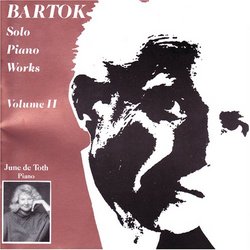| All Artists: Bela Bartok, pianist June de Toth Title: Bartok Solo Piano Works Volume 2 Members Wishing: 0 Total Copies: 0 Label: Eroica Classical Recordings Original Release Date: 10/27/1998 Re-Release Date: 12/15/1999 Genre: Classical Styles: Chamber Music, Forms & Genres, Suites, Historical Periods, Classical (c.1770-1830) Number of Discs: 1 SwapaCD Credits: 1 UPCs: 669910300220, 714548300125 |
Search - Bela Bartok, pianist June de Toth :: Bartok Solo Piano Works Volume 2
 | Bela Bartok, pianist June de Toth Bartok Solo Piano Works Volume 2 Genre: Classical
This set (this is the second out of seven CDs), would make an ideal introduction to Bartok's piano music, especially if you are still unfamiliar with the bulk of it. These are urbane, honest, eminently intelligible interpr... more » |
Larger Image |
CD Details
Synopsis
Album Description
This set (this is the second out of seven CDs), would make an ideal introduction to Bartok's piano music, especially if you are still unfamiliar with the bulk of it. These are urbane, honest, eminently intelligible interpretations that will draw the uninitiated into the texts of this extraordinarily rich music. In her exhaustive survey of his complete piano works June de Toth proves herself a smart, solid, and reliable pianist. She offers thoughtful and often eloquent readings that reject both hysteria and the kind of kamikaze approach of so many young piano lions. Its overall sobriety and discipline is such that the music speaks for itself In the wistful 'Street of Istvand', for example, or in the rugged yet oddly seductive sailor song 'In the Harbor of Nagyvarad', her no-nonsense surefootedness gives ample voice to Bartok's nostalgic melancholia. Indeed, in these works, part of the 42 Hungarian Folk Songs for Children, she fathoms each as a kind of apposite gestuary of hemiolas and unnerving hesitations, and as the stuff of musical speech. If Bartok was Hungary's answer to Moussorgsky, nowhere is it more evident than here. Capturing the essentially trochaic inflections of Hungarian speech with the knowing temperament of a native (Ms de Toth is full blood Hungarian) she lays out the keyboard songs with the patrician air of an old storyteller at a family gathering. Whatever one's ideas and taste may be in interpretation of Bartok, her performances are persuasive. Take particular note of her attractive readings of the 14 Bagatelles: these she portrays with a kind of arid simplicity that enhances their now playful, now lonely ethos.

 Track Listings (49) - Disc #1
Track Listings (49) - Disc #1